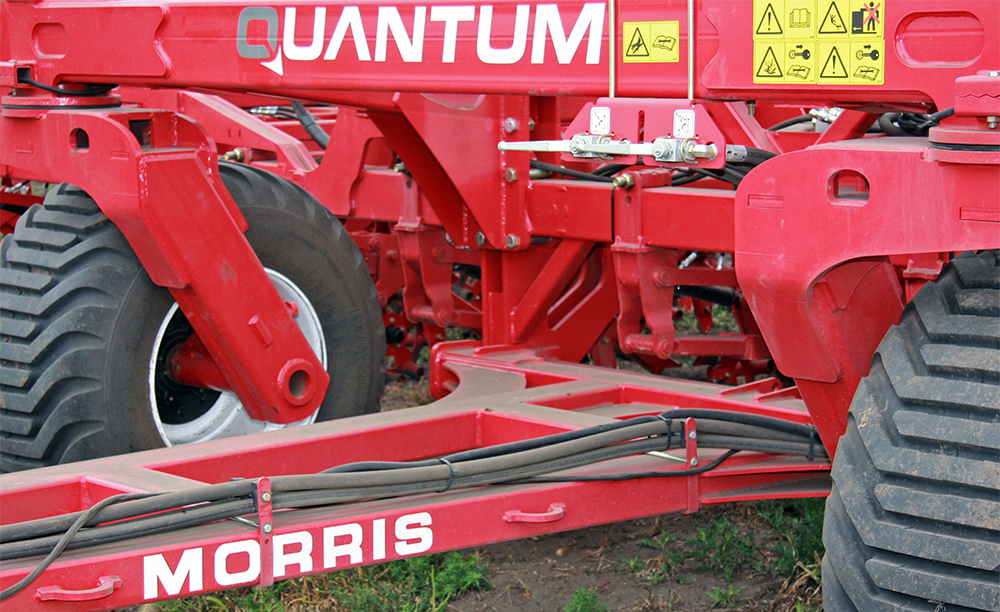Implement manufacturer’s financial troubles blamed on U.S. steel tariffs, poor ag economy and extraordinary inventory costs
Job cuts and closures loom at Morris Industries while the farm equipment company operates under creditor protection and seeks to restructure.
The long-time Saskatchewan-based business sought protection under the Companies’ Creditors Arrangement Act earlier this month and a Queen’s Bench justice has granted that until at least Jan. 18. The protection could then be extended or terminated, depending on progress.
The company cited extraordinary inventory costs, American steel tariffs and a poor agricultural economy for its financial difficulties.
Alvarez and Marsal Canada has been appointed monitor for the Morris Group, which comprises a manufacturing arm, sales and service, a real estate holding company and Morris USA.
Read Also

Farming Smarter receives financial boost from Alberta government for potato research
Farming Smarter near Lethbridge got a boost to its research equipment, thanks to the Alberta government’s increase in funding for research associations.
An affidavit filed by president Kevin Adair said the company has a liquidity crisis and needs to restructure to remain viable.
“Given the benefit of time and access to working capital, the Morris Group’s cash flows demonstrate an ability to repay the amounts it will require to be advanced pursuant to any credit facility that may be forthcoming from an interim lender,” he said.
Neither Adair nor the company’s lawyers responded to a request for comment.
Documents indicate Morris owes senior secured creditors about $36.3 million, including $21.7 million to BMO. It owes $4.4 million to other secured lenders and $12.7 million to unsecured lenders.
In November, it will be required to start repaying $3.75 million it received from Western Economic Diversification Canada for projects.
Preliminary financial statements for the fiscal year ending Aug. 31, 2019, indicate the company has $65.9 million in assets and $63.3 million in liabilities.
Established by George Morris as the Morris Rod-Weeder Co. in the 1920s, Morris Industries grew from Bangor, Sask., to Yorkton, to Minnedosa, Man., and Minot, N.D.
The head office relocated to Saskatoon after the family owned business was sold in 2007 to Casey Davis and a group of shareholders.
Ten years later, a new investor group led by Morris’s former president, Ben Voss, purchased a controlling interest.
The business began to experience difficulty after this, when an aggressive business plan, coupled with a “challenging agricultural economy,” pushed overhead and production costs too high.
Voss left the firm in September.
Adair’s affidavit says the company had a five-year growth strategy that required it to hire more leaders, increase investment and expertise, revise its marketing strategies and buy more raw material.
Morris did introduce its ShieldCore welding technology and the Quantum Drill, but at the same time acquired higher than normal inventory than its credit facilities could accommodate.
Adair said that as of August the inventory was worth $34.5 million. That compares to value between 2012 and 2018, which ranged from $21.5 million to $29.5 million.
The company also had to deal with large unforeseen warranty costs after the Quantum Drill came to market in 2018. In North America, the problematic drill openers were upgraded but in Australia, where the farming conditions were more difficult and wear-and-tear was greater, the openers had to be replaced. The company noted that drill openers represent about 40 percent of the overall cost of a unit.
“The combined costs of the North American upgrade and Australian replacement programs facing the Morris Group were significant, and well outside the estimates contained in the budget,” said the affidavit.
Increased production required increased raw material, and steel tariffs imposed by the United States and counter-tariffs in Canada greatly affected material costs. And, successive years of poor weather and declining farm income affected sales, the company said.
Earlier in 2019, Morris lost an arrangement with the National Bank of Canada that gave it early access to about 90 percent of its insured Australian receivables. Australia is the company’s second largest customer and the loss of the facility affected about $10.8 million in cash flow.
The Morris Group was in significant financial arrears by May 2019 and it didn’t have enough cash flow to meet payroll and statutory obligations for the final week of the year.
A temporary $3-million amendment to its operating line from BMO allowed the company to operate until Jan. 8, 2020.
The company is now seeking another $3 million in interim financing as it restructures.
The affidavit says the restructuring strategy may include winding down its sales and service facility in Virden, Man., relocating to a smaller head office, eliminating head office positions, reducing inventory, consolidating manufacturing operations into a single plant and expediting the collection of some of its $10.8 million Export Development Canada insured Australian receivables through some other arrangement.
The company has manufacturing plants in Yorkton and Minnedosa, but the affidavit doesn’t indicate which one might close.
It leases two Yorkton facilities for manufacturing and research and development that it sold in 2018 to reduce long-term debt.
At the time of the affidavit, the company employed 134 people.
“Due to the present production shutdown (and in order to accomplish the restructuring initiatives outlined above), it will be necessary to make further reductions to the Morris Group’s workforce,” the affidavit said.


















